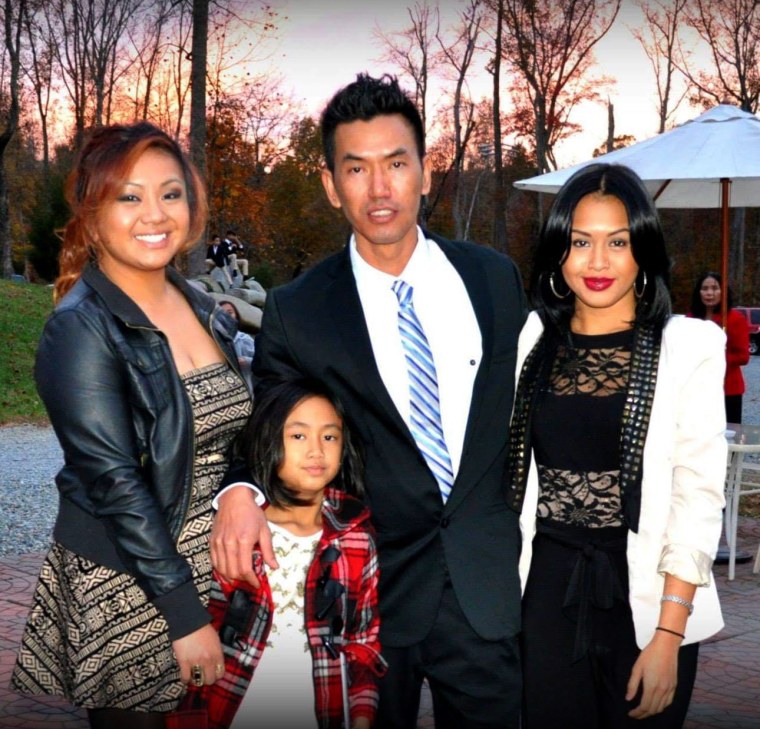Former Vietnam War refugee faces deportation to country he's never visited

The U.S. Immigration and Customs Enforcement headquarters in Washington in 2018.Andrew Harrer / Bloomberg via Getty Images fileOct. 29, 2019, 1:32 PM EDTBy Kimmy Yam
A former refugee who came to the United States after the Vietnam War is facing deportation to Cambodia, a country he has never visited.
Philya Thach, who is of Cambodian descent but was born in Vietnam, was detained earlier this month in the most recent round of Immigration and Customs Enforcement (ICE) raids on the Southeast Asian community. While he came to the country legally with refugee status, Thach, 42, was given an order of removal and lost his status after serving time behind bars decades ago.
He is currently being held in the Montgomery County Correctional Facility in Texas as he awaits travel documents from the Cambodian government needed for deportation.

While Thach had been regularly checking in with ICE every two years for the past 20 years with no issues, its agents stormed his home in Madera, California, earlier this month without a valid warrant, his daughter Alyssa Thach said. Advocates say that the frequency of ICE raids has ramped up significantly under the Trump administration.
“We heard of the ICE raid through his partner, Kay, and were terrified,” Alyssa, who lives in Charlotte, North Carolina, told NBC News. “Our hearts dropped as soon as we heard the news, and we were scared he was going to get deported immediately. We were afraid that we weren't going to be able to do anything to stop the deportation because he is so far away.”
Cat Bao Le, the executive director of the Southeast Asian Coalition (SEAC) in Charlotte, a nonprofit that’s been working with Thach's family, told NBC News that a variety of factors following his family’s resettlement contributed to his current circumstances.
Thach’s family escaped Cambodia during the Khmer Rouge genocide and fled to Vietnam before he was born. The family ended up in a Thai refugee camp before resettling in the United States. The family, which struggled with poverty, bounced from city to city before eventually putting down roots in west Charlotte, in a neighborhood that was severely underresourced and highly policed at the time.
With little financial resources and a child on the way, Thach was arrested for petty theft and breaking and entering vehicles when he was 18 years old.
“At the time my mom was pregnant with me, he had an underpaying job as a materials handler that was not able to support us financially. He was only trying to take care of his family,” Alyssa Thach said.
Thach, who goes by “Philly,” received an order of removal after serving roughly one year in prison. Since then, he’s had no contact with the criminal justice system and serves as the sole caretaker of his parents Simoun Sam and Kalyan Thach. He considers the U.S. his only home, his daughter said. He cannot speak Khmer nor does he have any living relatives in Cambodia because they were killed in the genocide.
“My father isn't a bad guy. He is a hard worker and a well-beloved, father, son, friend, and partner,” she said. “He is an avid Buddhist and just wants to provide a better life for all of his family members.”
Le pointed out that Thach’s story is representative of what many experts describe as the migration-to-school-to-prison-to-deportation pipeline. Many Southeast Asian refugees like Thach were provided little support to appropriately start over in the United States and settled in poorly funded, highly policed urban centers, such as Long Beach and Stockton, California, or the Bronx, New York. Some advocates point to this lack of resources for why some were caught in a cycle of dropping out of school, committing crimes, serving their prison sentences, and eventually facing deportation.
Many advocates like Le argue that former refugees, who’ve already served their sentences, should not be subject to additional punishment in the form of deportations.
“People like Philly made mistakes while trying to help his family survive, and people like him have paid their debt to society, even within a justice system where the odds were stacked against him in terms of language, resources, and access to lawyers who understood the immigration consequences, and so on,” Le said.
She added, “It's easier for some people to see them as disposable and deportable, rather than people who are now fathers, partners, grandparents even, who have little or no ties to the country they fled."
In the past two fiscal years, the deportation of Cambodian nationals has increased by 279 percent. The subject of repatriations continue to be a source of tension between the U.S. and Cambodia. Cambodia is one of a handful of countries that ICE considers “recalcitrant” because its government regularly refuses to issue travel documents required for the U.S. to carry out a deportation.
In 2002, the two countries struck an agreement in which Cambodia consented to taking in a limited number of deportees. The agreement prompted backlash and protests from the Cambodian American community, who raised humanitarian concerns around the deportations since a significant portion of those at risk came to the U.S. as refugees. The Cambodian government ended up halting the issuing of travel documents for deportation in August 2017.
In response, the Trump administration slapped visa sanctions on the country, barring high-ranking Cambodian officials and their families from traveling to the U.S. Cambodia caved to U.S. pressures and by the end of 2017, the country issued roughly 50 travel documents. That number has skyrocketed in the past two years.
It is unclear as to how long it will take for the Cambodian government to issue the travel documents for Philya Thach, but in the meantime, his lawyers are exploring options to extend his stay in the United States.
ICE did not provide a comment in response to NBC News' request.
